
Exposure and Health
Scope & Guideline
Empowering researchers to tackle exposure assessment challenges.
Introduction
Aims and Scopes
- Environmental Exposure Assessment:
The journal emphasizes rigorous methodologies for assessing exposure to environmental contaminants, including heavy metals, pesticides, and endocrine-disrupting chemicals. - Health Risk Analysis:
It includes studies that evaluate the health risks associated with various environmental exposures, employing statistical models and risk assessment frameworks. - Biomonitoring and Epidemiological Studies:
Research often utilizes biomonitoring techniques and epidemiological approaches to establish connections between environmental exposures and health outcomes. - Focus on Vulnerable Populations:
The journal highlights research that examines the effects of environmental exposures on vulnerable groups, such as children, pregnant women, and communities near industrial sites. - Interdisciplinary Approaches:
It encourages interdisciplinary research that combines environmental science, toxicology, public health, and policy analysis to address complex health issues related to exposure.
Trending and Emerging
- Cumulative and Co-exposure Assessments:
There is a growing trend in studies that assess the health impacts of cumulative exposures to multiple pollutants, reflecting a more holistic view of environmental health. - Focus on New Contaminants:
Emerging contaminants such as microplastics, PFAS (per- and polyfluoroalkyl substances), and endocrine disruptors are increasingly being studied, indicating a shift towards understanding their health implications. - Maternal and Child Health Research:
Research focusing on the effects of environmental exposures during pregnancy and early childhood is on the rise, highlighting the importance of early life stages in health outcomes. - Geospatial and Temporal Analyses:
There is an increased use of geospatial analysis to assess exposure risks and health outcomes, indicating a trend towards understanding the spatial distribution of pollutants and their health impacts. - Integrated Approaches to Environmental Health:
The journal is seeing a rise in studies that integrate various disciplines, such as toxicology, epidemiology, and public health policy, to address complex environmental health issues.
Declining or Waning
- Traditional Pollutant Studies:
Research focusing solely on traditional pollutants such as lead and mercury appears less frequently, possibly due to a shift toward more complex mixtures and new emerging contaminants. - Single Pollutant Exposure Studies:
There is a noticeable decline in studies that examine the effects of single environmental pollutants, as the field increasingly recognizes the importance of cumulative exposure assessments. - Laboratory-Based Toxicology Studies:
Laboratory studies that do not connect to real-world exposure scenarios are becoming less common, as the emphasis shifts toward field-based research that reflects actual human exposure.
Similar Journals
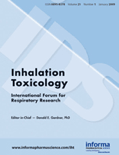
INHALATION TOXICOLOGY
Exploring the Impact of Inhaled Toxins on Health.Inhalation Toxicology, published by Taylor & Francis Ltd, is a premier journal dedicated to advancing the field of toxicology with a particular focus on inhalation exposure and its impact on human health. Established in 1989, this journal provides a vital platform for original research, reviews, and case studies that explore the toxicological effects of inhaled substances, making it essential reading for researchers, health professionals, and regulatory scientists. With an Impact Factor that situates it in the Q3 category in both Health, Toxicology and Mutagenesis, the journal asserts its relevance within the scientific community, particularly emphasizing its contributions as indexed by Scopus rankings in related fields. Although it follows a traditional access model, the journal's commitment to delivering high-quality research continues to foster significant discussions and advancements in understanding inhalation toxicology. For those at the forefront of environmental science and pharmacology, Inhalation Toxicology is an indispensable resource for both current research and future innovations in the discipline.
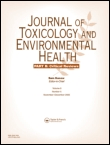
JOURNAL OF TOXICOLOGY AND ENVIRONMENTAL HEALTH-PART B-CRITICAL REVIEWS
Exploring the intersection of toxicity and environmental wellness.Welcome to the JOURNAL OF TOXICOLOGY AND ENVIRONMENTAL HEALTH-PART B-CRITICAL REVIEWS, a prestigious publication under TAYLOR & FRANCIS INC based in the United Kingdom. With an impressive impact factor and ranked in the Q1 category for both Health, Toxicology and Mutagenesis, and Toxicology, this journal provides critical insights into the fields of toxicology and environmental health. Since its inception in 1998, it has become a key resource for researchers, professionals, and students, offering rigorous peer-reviewed articles that synthesize and critically appraise current knowledge in the discipline. The journal is recognized globally, ranking #5 in Toxicology and #12 in Environmental Science according to Scopus, highlighting its crucial role in advancing research and understanding in these essential areas. The journal also embraces open access options, making it easier for a broader audience to access vital research findings. Engage with the latest developments and critical analyses that are shaping the future of environmental health and toxicology by exploring our comprehensive collection of reviews and articles.
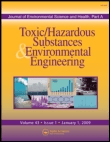
JOURNAL OF ENVIRONMENTAL SCIENCE AND HEALTH PART A-TOXIC/HAZARDOUS SUBSTANCES & ENVIRONMENTAL ENGINEERING
Pioneering research for a safer, healthier environment.JOURNAL OF ENVIRONMENTAL SCIENCE AND HEALTH PART A-TOXIC/HAZARDOUS SUBSTANCES & ENVIRONMENTAL ENGINEERING, published by TAYLOR & FRANCIS INC, stands at the forefront of research in the dynamic fields of environmental science and public health. With an ISSN of 1093-4529 and an E-ISSN of 1532-4117, this journal serves as a pivotal platform for disseminating significant findings regarding toxic substances and their impact on the environment and human health. It is categorized in the Q3 quartile for both Environmental Engineering and Medicine in 2023, showcasing its relevance within these disciplines. Researchers will find valuable insights in the 90th rank among 197 in the Environmental Science and Engineering category, placing it in the 54th percentile among its peers. While access options remain traditional rather than open-access, the journal is dedicated to serving as an essential resource for professionals and academics engaged in understanding the intricate connections between hazardous materials and environmental safety. The journal has consistently published critical research since its inception in 1978 and is committed to advancing knowledge up to 2024, making it a crucial venue for ongoing discussions and developments in environmental health.
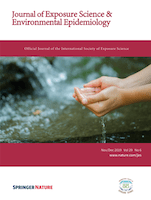
Journal of Exposure Science and Environmental Epidemiology
Illuminating Connections Between Pollution and HealthJournal of Exposure Science and Environmental Epidemiology, published by SPRINGERNATURE in the United Kingdom, is a leading platform for researchers and practitioners dedicated to understanding the interplay between environmental factors and human health. With an impressive impact factor and Q1 and Q2 rankings across multiple categories such as Pollution and Public Health, the journal has established itself as a critical resource in the fields of epidemiology, toxicology, and environmental science. Covering a wide spectrum of studies from 2006 to 2024, it aims to disseminate timely research that empowers professionals and informs policy decisions. Although there is no open access option at this time, the journal's rigorous peer-review process ensures that only high-quality research is published, further cementing its reputation as a vital source of knowledge for advancing public health and environmental protection.
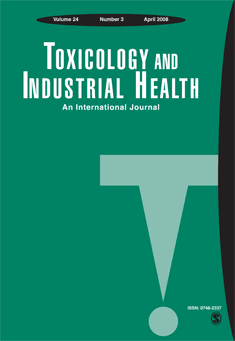
TOXICOLOGY AND INDUSTRIAL HEALTH
Bridging research and application to enhance environmental safety.TOXICOLOGY AND INDUSTRIAL HEALTH, published by SAGE PUBLICATIONS INC, is a premier journal in the field of toxicology, public health, and environmental health, with a significant history dating back to 1985. With its ISSN 0748-2337 and E-ISSN 1477-0393, the journal provides a platform for disseminating groundbreaking research and comprehensive reviews that address the complexities of toxic substances in industrial and occupational settings. Despite its Q3 ranking among peers in health, toxicology, and public health, this journal is becoming increasingly influential, reflected in its growing citation metrics. Researchers and professionals benefit from its commitment to fostering knowledge in both theoretical and practical contexts, making it an essential resource for those dedicated to advancing understanding in this vital field. The journal's main objectives include promoting research addressing the implications of toxicology on health and safety standards across industries, ensuring accessibility to current studies for a global audience. Overall, TOXICOLOGY AND INDUSTRIAL HEALTH plays a critical role in bridging the gap between research and real-world applications, proving invaluable to students, professionals, and researchers alike in their pursuit of enhancing public health and environmental safety.
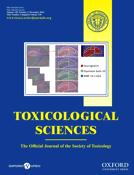
TOXICOLOGICAL SCIENCES
Unraveling Toxicity to Safeguard Our FutureTOXICOLOGICAL SCIENCES, published by Oxford University Press, is a premier journal in the field of toxicology that has been a cornerstone of scientific discourse since its inception in 1981. With an impressive 2023 impact factor and ranked in the Q1 category for Toxicology, this journal is highly regarded among researchers, professionals, and students dedicated to pharmacology and toxicology. The journal is committed to advancing the understanding of toxicological science, covering a breadth of topics that include the mechanisms of toxicity, risk assessment, and the regulatory aspects affecting public health. With an ISSN of 1096-6080 and an E-ISSN of 1096-0929, TOXICOLOGICAL SCIENCES facilitates open access scholarly work, ensuring that critical research reaches a global audience and promotes collaborative learning. As it converges towards 2024, the journal remains pivotal in shaping the future of toxicology research, providing insights that are essential for developing safer chemicals and protecting environmental health.
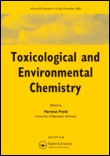
TOXICOLOGICAL AND ENVIRONMENTAL CHEMISTRY
Bridging toxicology and environmental science for a cleaner world.TOXICOLOGICAL AND ENVIRONMENTAL CHEMISTRY is a pivotal journal published by Taylor & Francis Ltd, addressing critical intersections between environmental chemistry and toxicology since its inception in 1979. With its ISSN 0277-2248 and E-ISSN 1029-0486, the journal serves as a platform for rigorous research and innovative methodologies in pollution control, health implications of environmental chemicals, and the broader spectrum of toxicological studies. Although it currently does not offer open access, the journal's impact in the field is underscored by its Category Quartiles rankings in 2023, placing it in Q3 across Environmental Chemistry, Health, Toxicology and Mutagenesis, and Pollution categories. Furthermore, its Scopus rankings reveal its significant role within the scientific community, specifically in areas such as Environmental Science and Toxicology. The journal aspires to foster multidisciplinary dialogue and advance knowledge that contributes to environmental sustainability and public health, making it an essential resource for researchers, professionals, and students dedicated to these fields.
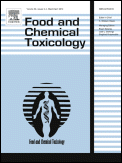
FOOD AND CHEMICAL TOXICOLOGY
Pioneering insights into the interplay of food and chemicals.FOOD AND CHEMICAL TOXICOLOGY, published by Pergamon-Elsevier Science Ltd, is a prestigious journal with a significant impact in the fields of food science, medicine, and toxicology, reflecting its Q1 and Q2 quartile rankings in various categories as of 2023. Established in 1982, this journal continues to serve as an essential platform for disseminating high-quality research focused on the toxicological assessment of foods and chemicals, aiming to advance knowledge that affects public health and safety. With a pivotal role in integrating diverse disciplines, including pharmacology and agricultural sciences, the journal ranks impressively within the top percentiles—specifically 95th in Toxicology and 92nd in Food Science on the Scopus metrics. Though it operates on a traditional subscription model, the journal is committed to providing valuable insights and findings to researchers, professionals, and students across the globe, making it a vital resource in the ongoing discourse around food safety and environmental health. Its comprehensive scope underscores its importance in shaping evidence-based policies and practices.
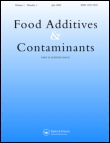
Food Additives & Contaminants Part B-Surveillance
Championing transparency in food safety research.Food Additives & Contaminants Part B-Surveillance, published by Taylor & Francis Ltd, is a premier journal dedicated to the rigorous analysis and surveillance of food additives and contaminants. With an ISSN of 1939-3210 and an E-ISSN of 1939-3229, this journal caters to a global audience, addressing crucial issues in the fields of Food Science, Public Health, and Toxicology. Recognized for its substantial contribution to these areas, it holds a Q2 ranking in both Food Science and Public Health, demonstrating its influence and relevance with an increasing audience within the scientific community. The journal publishes critical research from 2008 onwards and continues its commitment to advancing knowledge up to 2024. Ideal for researchers, practitioners, and students, Food Additives & Contaminants Part B-Surveillance serves as a vital platform for sharing innovative findings and fostering discussions that promote food safety and public health.
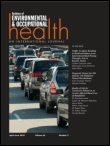
Archives of Environmental & Occupational Health
Fostering collaboration for a sustainable future in health.Archives of Environmental & Occupational Health is a prestigious journal published by Routledge Journals, Taylor & Francis Ltd, dedicated to advancing research and knowledge in the realms of environmental science, occupational health, and toxicology. With an ISSN of 1933-8244 and an E-ISSN of 2154-4700, this peer-reviewed journal has gained significant recognition, currently holding a Q2 ranking in Environmental Science and Q3 rankings in Health, Toxicology and Mutagenesis, and Public Health. Established in 2005, it serves as a vital platform for researchers, practitioners, and policymakers alike who aim to address and disseminate findings on pressing environmental and occupational health issues. The journal is not open access, allowing for rigorous peer review processes while still reaching a broad readership. As it converges through 2024, the Archives of Environmental & Occupational Health continues to play a critical role in shaping discourse and fostering innovation in the field, making it an essential resource for those committed to improving both human health and the environment.